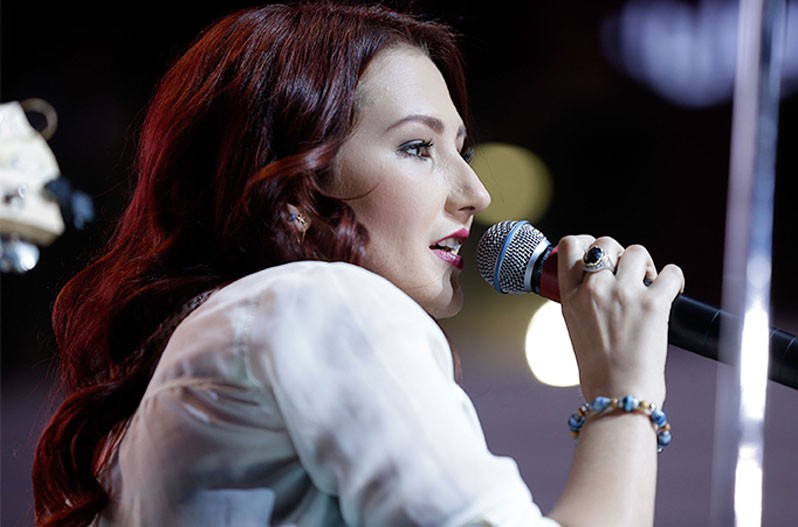[dropcap]I[/dropcap]n early January, 300 actresses and entertainment executives came together to form #TimesUp, a coalition dedicated to combating sexual harassment and misconduct in the workplace. The movement was initially formed in October in response to a slew of sexual misconduct accusations against Harvey Weinstein. In the wake of allegations against Weinstein, social activist Tarana Burke created the hashtag #MeToo as a means for women and men from all walks of life to share their experiences of sexual harassment and assault.
Videos by Wide Open Country
As stories flooded in, including those from high profile members of the film and music industry, many wondered when the skeletons would fall out of Music Row's closets. And soon they did. Country artist Austin Rick stated that high powered publicist Kirt Webster drugged and assaulted him while he was on the Webster PR roster, leading to an outpouring of allegations of sexual misconduct against Webster from former employees. Over a dozen artists, including Dolly Parton, left the PR firm.
Still, in the months following #MeToo, the country music industry has remained uncomfortably silent. And that's why the country music industry needs a #TimesUp movement now more than ever. Because country's awakening is long overdue.
Some artists have spoken out
Country singer Katie Armiger was just a teenager when she went on her first radio tour. The Texas native told Fox News that during a stop at a Texas station, a radio DJ groped her and asked, "When are you going to be legal?"
Sadly, things only got worse. When she was signed with Texas-based label Cold River Records, Armiger says she was told to hug, kiss and flirt with radio programmers and encouraged to purchase "hot, game changing" clothing. During a promo for her 2010 album Confessions of a Nice Girl, Armiger says a radio DJ tried to grope her under the table during an on-air interview.
Armiger left Cold River Records, later releasing a statement implying that her split with the label was due to the label pressuring her to do things she was uncomfortable with.
"My label had expectations for how I should behave to get ahead—particularly how I should interact with influential men in the industry. I just wasn't willing to take that approach," Armiger said in the statement.
Last year, Cold River Records head Pete O'Heeron released a statement denying that Armiger had ever told the label about the sexual harassment she experienced. In October, former Cold River employee Staci Kirpach shared a 2015 email correspondence between Armiger and O'Heeron. In the email Kirpach shared on Twitter, O'Heeron appears to be aware of at least some of Armiger's concerns. In regard to the label's suggestion that she flirt with radio programmers, O'Heeron appears to tell Armiger, "If that makes you uncomfortable, I'm very sorry... but that's the market you operate in."
In an interview with Billboard, O'Heeron called the country music industry an "island of morality in the entertainment business." But when Armiger spoke out about what happened to her, the response was less than moral. She wasn't met with open arms from a support system. She was sued.
In November, Cold River Records filed a lawsuit against Armiger, claiming that her statements violated a "non-disparagement clause" that was part of a 2016 settlement reached after Armiger left the label.
Armiger has filed a countersuit against Cold River Records. She set up a Go Fund Me campaign to help with legal costs.
In 2016, country singer Meghan Linsey spoke out about a 2010 incident in which a powerful man in the industry put his hand under her skirt and groped her in front of a bus full of people. Linsey demanded the man stop touching her. The following night, her assaulter approached her with a threat, telling her he could put her in the "middle of the ocean where no one would ever hear from you again."
Linsey said she told the head of her then label Big Machine Records. Again, the message was clear. If she wanted a career in country music, she had better keep quiet.
Linsey told Buzzfeed the culture of silence in country music makes it more difficult for victims to talk about harassment and abuse.
"Country music is so hush-hush about everything," she said. "It's so much harder to speak out."
A culture of silence
Just as in the film industry, sexual assault and harassment in the country music industry is not a new problem. It's as old as the industry itself.
Last year, industry veteran Lari White, who had a string of hits in the early '90s, told the Tennessean that sexual harassment was always a common occurrence.
"I encountered on a regular basis rude comments and sexual innuendo and cat calls and overt sexual propositions in professional settings," White said.
Women in country music are repeatedly told that their bodies are not their own, their voices don't matter and their talent is not enough.
How many women have came to Nashville with the lifelong dream of being a country singer only to be met with a manager, record label or radio programmer telling her she'll never have her music heard unless she's willing to compromise her integrity? How many women have seen their promising music career come to an abrupt halt because they're met with endless sexual harassment and abuse? How many stories have we not heard?
Similar to women in film and media (and, really, nearly all professions), women in country music have been expected to play the game. Keep your mouth shut and maybe we'll play your record. Those that refuse risk being shut out of radio for good.
Last year, singer-songwriter Angaleena Presley recounted an encounter she had with a radio rep from her record label. Presley asked him why he hadn't pushed her songs to radio.
"Staring at my breasts, he said, 'Well, you didn't look like this back then,'" Presley told the Tennessean last year.
When men like that help control the charts, the decline of women on country radio seems even less surprising
The time is now
The #MeToo and #TimesUp movements show that there is power in numbers. They have allowed women to come together in solidarity and end the culture of silence in the industry. The movements allow high powered and independent artists to band together and say enough is enough.
Let's be clear: no victim of sexual misconduct is obligated to share their story publicly. Talking about sexual assault and harassment is often painful and frightening. Victims face being called liars, having their experience downplayed or dismissed entirely. They're forced to field questions. Why now? Why didn't you speak out sooner? (Often times they did, in fact, speak out -- immediately. In the case of Armiger, Linsey and no doubt countless others, the victims reported the abuse only to be told to keep quiet.)
But for those that are ready to speak out, a #TimesUp movement in country music would allow victims to come together in solidarity. There would be a support system in place. There would be an outlet for them to share their stories. And it's high time their voices are heard.
Do you have a confidential news tip or story you want to share? You can reach us through our secure email at [email protected].




